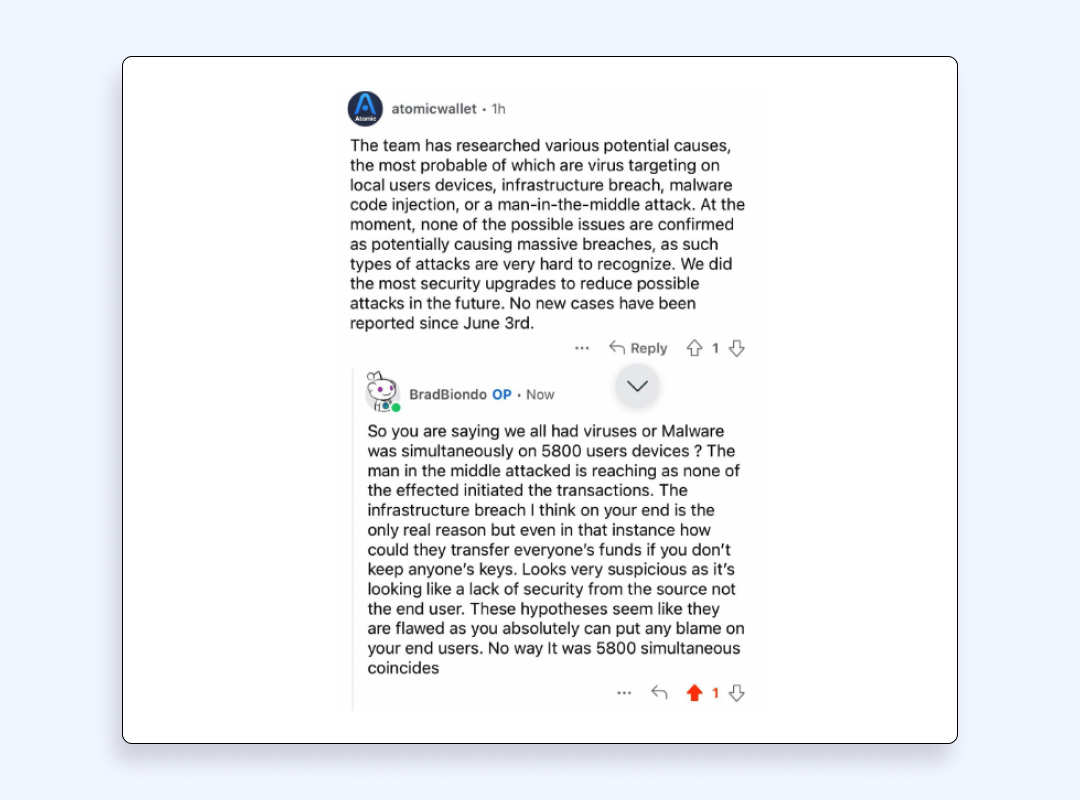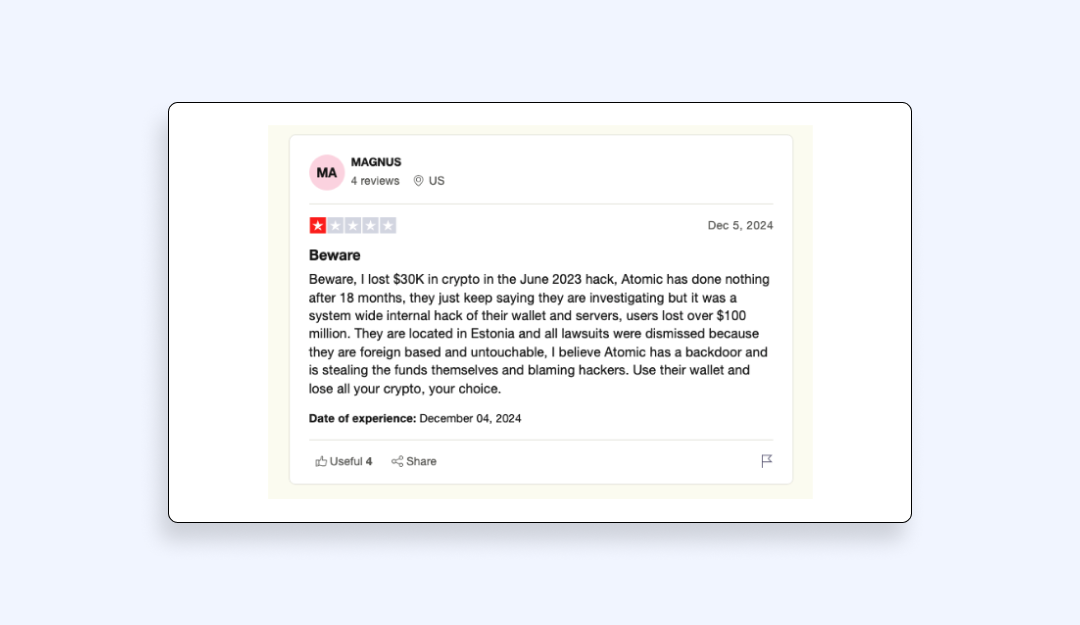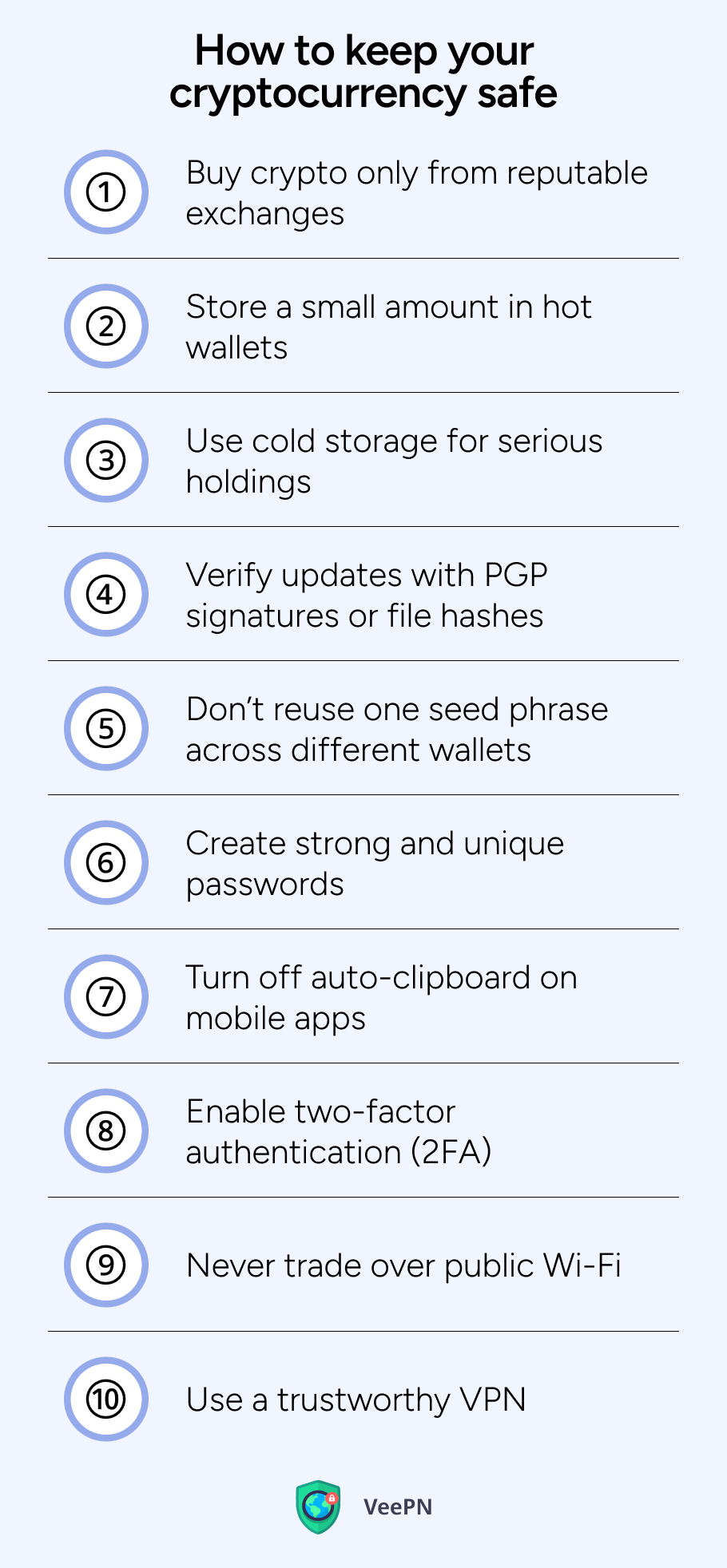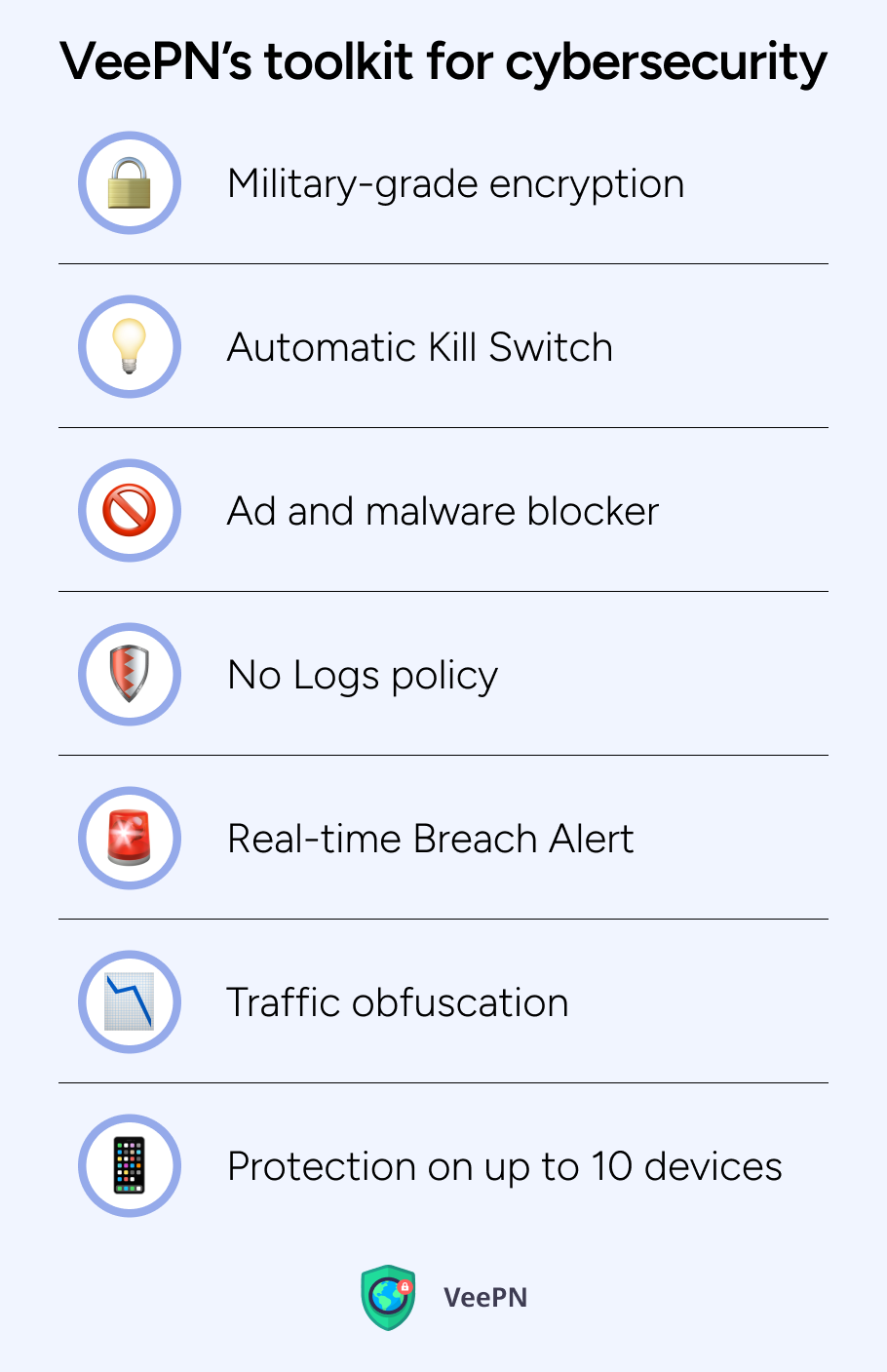Atomic Wallet Review: Is Atomic Wallet Safe to Use?

The self-custody trend in crypto seemed very prominent until June 2023, when headlines started to shout: Atomic Wallet hacked. Such news spread fast across Reddit and left users stunned. Wallet owners woke up to empty balances, blockchain detectives traced $100 million in stolen funds, and the incident became another horror story for anyone who keeps coins in a hot wallet.
But how do things look today? In this post, we will provide a brief Atomic Wallet review, discussing what went wrong, why the criticism keeps growing, and how you can keep your own crypto assets secure, no matter whether you prefer to continue using Atomic or go for other wallets.
The notorious Atomic Wallet breach. What has happened?
Atomic Wallet burst onto the crypto scene in 2018 with a simple pitch: one 12-word recovery phrase, support for 500+ coins, and built-in Atomic swaps so you could skip the long lines on centralized exchanges. By 2022, it boasted millions of users and dollars in user-held assets. Quite promising, to say the least.
But in June 2023, many Atomic Wallet users’ accounts got drained. Experts like ZachXBT and CertiK reported over $35 million in stolen funds. Later on, there were mentions of stolen cosmic $100 million. Exchanges tried to block the hacker’s addresses, but the money was already gone.
Theories and versions
There are a few potential versions emerged of why the security breach had happened:
Coding flaw
CertiK’s Hugh Brooks suggested that a bug in the Atomic’s application exposed Atomic Wallet users’ private keys, which later on led to the theft of approximately $35 million.
Supply-chain attack
Researchers identified malicious npm packages targeting Atomic Wallet. These are the software components uploaded to the Node Package Manager (npm) repository. They are often masked as legitimate tools, but in reality designed to steal personal data or inject harmful code during the application development. So, this also could be an indication of a possible supply-chain attack.
Server-side key leak
Some users speculated that a server-side leak of private keys might have been responsible. However, there is no concrete evidence to that.
Seems like Atomic Wallet had a malicious update that sends your private keys to an attacker once you open the app.
— Joko ⚡️ (@jokoono) June 4, 2023
The absolutely terrible response from the AW team leads me to believe this is a rug pull. Peoples are still being rugged right now and there's zero communication. pic.twitter.com/v67CJtedNc
Atomic Wallet’s team response
After the hack, Atomic Wallet responded on their blog that “<1 % of users” were hit. They also said that their team researched the problem and they found that the most probable causes for users’ money loss were viruses on local users’ devices, infrastructure breach, malware code injection, or man-in-the-middle attack.
Such a response sounded like salt in the wound. Users didn’t believe there were 5800 devices infected simultaneously, and thought it was weak Atomic Wallet security to blame.

Konstantin Gladych’s role
Konstantin Gladych is the co-founder of Atomic Wallet. The guy has a murky past in crypto. He previously founded Changelly, which froze withdrawals in 2018. Before that, he ran Clickky, a company linked to click fraud. Though not officially proved, some angry Atomic Wallet users believe Gladych moved Atomic’s business entities to Tallinn to avoid legal fallout in the US.

All in all, the breach itself, users’ reviews, and the co-founder’s shady practices lead to the idea that Atomic Wallet is not worth your trust. Now, let’s have a look at the lessons we can learn from the situation.
10 tips to keep your cryptocurrency safe
These tips will help you protect your crypto from going through another disaster like the case with Atomic Wallet. They may feel like overkill, but they can become your shield against many security threats.

1️⃣ Buy crypto only from reputable exchanges
Use platforms with strong security like Kraken, Gemini, Coinbase, Crypto.com, or Binance. But before signing in and buying, double-check website URLs, as there are cases when users come across phishing sites that realistically mimic real ones.
2️⃣ Store a small amount in hot wallets’
Treat hot wallets, especially mobile-friendly ones, as a real wallet in your pocket. Keep just enough for day-to-day use. Don’t think it is a reliable and protected vault. If it connects to the Internet, it’s always a target for con artists.
3️⃣ Use cold storage for serious holdings
For larger or long-term digital assets, move them to cold crypto wallets (paper or hardware wallets) that stay offline. Cold storage reduces your exposure to online threats like malware or remote hacks.
4️⃣ Verify updates with PGP signatures or file hashes
Before installing an application or software wallet update, check that the file is legit by verifying its SHA256 hash or PGP signature from the official website. It’s like checking a fingerprint. If it matches, then the file is safe. If not, then it can be malware. It takes mere minutes but can protect your crypto from hidden threats.
5️⃣ Don’t reuse one seed phrase across different wallets
This tip is often overlooked. If your backup phrase somehow gets leaked for one platform, your other wallets can be compromised. Treat each wallet as a separate vault with its own unique key. You can write down your seed phrase on paper and store it securely.
6️⃣ Create strong and unique passwords
Use long passwords with symbols and varied cases. Never reuse passwords for different online services. Password managers like Bitwarden or 1Password help keep them safe and generate new ones easily.
7️⃣ Turn off auto-clipboard on mobile apps
Many mobile wallet apps copy seed phrases to the clipboard during setup. If there’s hidden malware on your device, it can instantly grab that data. Clear your clipboard and avoid apps that don’t let you opt out of auto-copy. Always type sensitive info manually and keep your browser and antivirus tools updated.
8️⃣ Enable two-factor authentication (2FA)
If you want to protect your wallet application better, consider adding an additional login step to the verification process. If the application you use allows you to do it, the digital wallet will send an SMS code to your mobile phone each time you log in.
9️⃣ Never trade over public Wi-Fi
Hackers can spy on open Wi-Fi networks like those in coffee shops or airports. Avoid doing such crypto transactions or financial operations. If you need to do it anyway, use a VPN service to secure your financial data.
🔟 Use a trustworthy VPN
The VPN service encrypts your traffic and conceals your real IP address to protect you from security threats and Internet trackers. The VPN service also allows you to have access to crypto exchanges, which are under geo-restrictions when you’re traveling.
But VPN services differ from one another. Free VPNs may sell your logged activities to third parties to maintain their services. They can also embed harmful software into your device. And the service quality of free VPN providers is usually poor as they provide weak encryption and restrict server options. To shield your crypto funds, consider using a high-quality VPN provider like VeePN.
VeePN’s – your reliable cybersecurity toolkit
Let’s be honest, not a single VPN can fix a buggy wallet app and its security vulnerabilities. But it can block a few major threats and keep some doors closed to hackers. This is exactly what VeePN can do:

🔒 Military-grade encryption
VeePN offers AES-256 encryption, which is the gold standard used by banks and governments. It makes sure that your online transactions and crypto operations are scrambled so that snoops won’t be able to intercept them.
💡 Automatic Kill Switch
In case your VPN connection unexpectedly drops or glitches, VeePN instantly blocks Internet traffic until your connection is reestablished. This way, your real IP address and other information like financial data never leak to other websites.
🚫 Ad and malware blocker
VeePN’s NetGuard features include blocking malicious sites and ads that may hide phishing links or inject harmful scripts. The tool will be perfect for avoiding fake wallet updates or scam token airdrops.
🛡 No Logs policy
VeePN respects your privacy by following a strict No Logs policy. It means that we don’t keep any records of your browsing activity, connection timestamps, or data usage.
🚨 Real-time Breach Alert
When your data shows up in a breach database, you’ll receive a notification. VeePN monitors dark web forums and leak repositories so that you can act fast if your email or credentials are compromised.
📉 Traffic obfuscation
VeePN hides your real IP address and then masks your VPN traffic to look like normal HTTPS. Why is it helpful? You can stay undetectable even in VPN-hostile environments. The tool will be useful for trading or accessing exchanges in restricted regions.
📱 Protection on up to 10 devices
No matter whether you’re trading on a PC, monitoring wallets on a mobile app, or checking prices on your tablet. VeePN allows you to secure all of them with reliable VPN features under one account.
Try VeePN without any risk, because we offer a 30-day money-back guarantee.
FAQ
Not quite. The 2023 hack proved that hackers can drain coins from your account, and you are unlikely to get any significant support from a company. Consider treating it like cash in your pocket. Keep only a limited number of tokens there and move big holdings to cold storage. After all, hot wallets generally are not the best place to keep your funds safe. Overall, Atomic Wallet is not suitable as a custodial wallet.
Yes, the app itself is legitimate. But “legit” doesn’t mean risk-free. Atomic Wallet factually leaves security squarely on you. The 2023 breach includes a nine-figure drain from users’ accounts. If you want peace of mind, diversify your crypto assets across trusted cryptocurrency wallets and add security layers like hardware devices and a good VPN like VeePN.
VeePN is freedom
Download VeePN Client for All Platforms
Enjoy a smooth VPN experience anywhere, anytime. No matter the device you have — phone or laptop, tablet or router — VeePN’s next-gen data protection and ultra-fast speeds will cover all of them.
Download for PC Download for Mac IOS and Android App
IOS and Android App
Want secure browsing while reading this?
See the difference for yourself - Try VeePN PRO for 3-days for $1, no risk, no pressure.
Start My $1 TrialThen VeePN PRO 1-year plan







